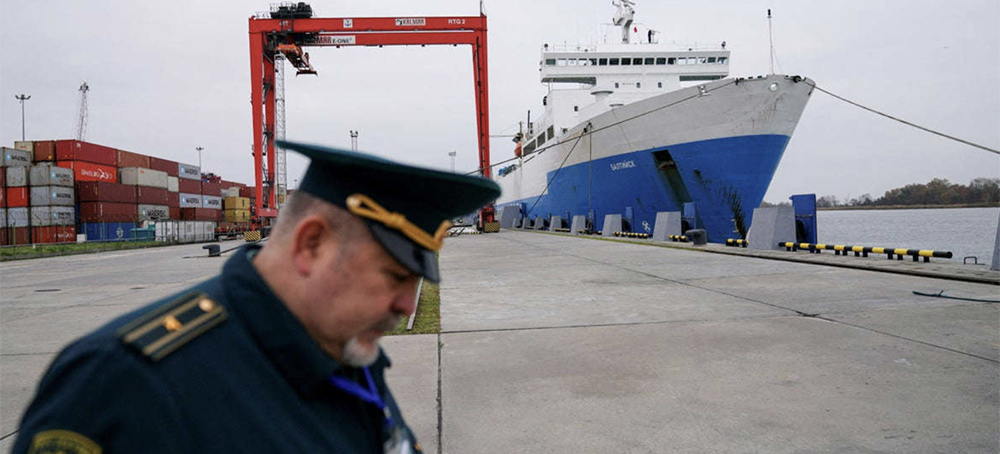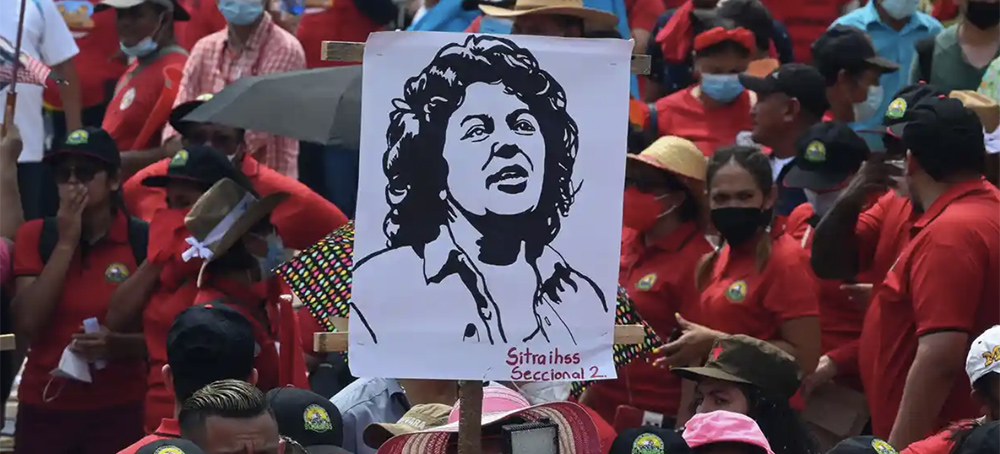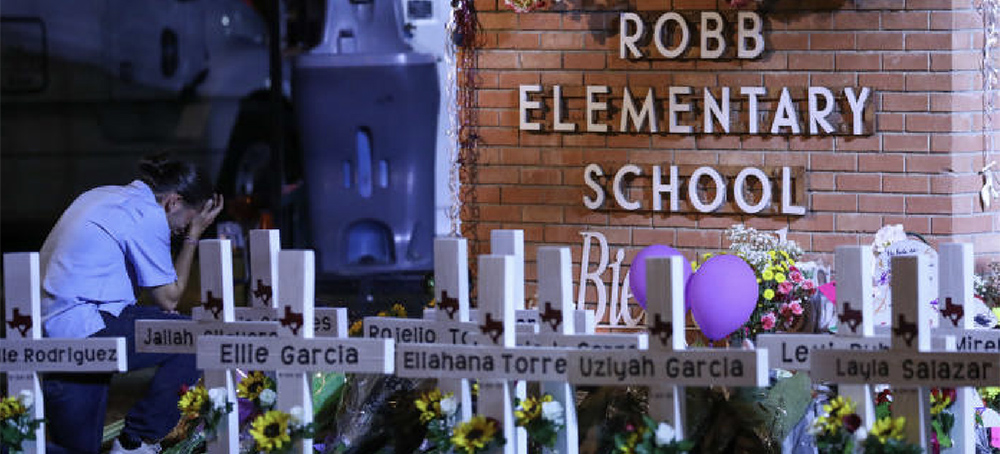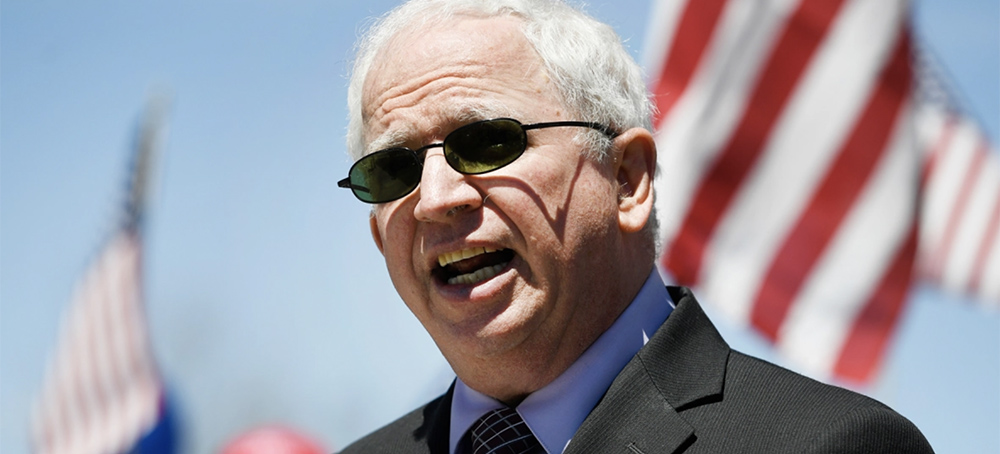YOU'RE HERE! SUBSCRIBE & SUPPORT FOR INFORMATION THAT'S NOT WHAT YOU GET FOR FREE!
Throwing Fundraising Messages at a Brick Wall
We are doing everything in our power to get some attention to the funding drive. You’re here, we can see that from the readership numbers, but you’re not paying any attention to the fundraiser, we can see that from the donation numbers.
This creates significant stress and seriously damages our ability to do the work you depend on us for.
Ignoring funding does not work. It never has.
In earnest.
Marc Ash
Founder, Reader Supported News
If you would prefer to send a check:
Reader Supported News
PO Box 2043 / Citrus Heights, CA 95611
Follow us on facebook and twitter!
Live on the homepage now!
Reader Supported News
Trump in recent weeks has told confidants that he sees no reason to defend the lawyer who tried to help him overturn the 2020 election, sources tell Rolling Stone
Eastman worked for Trump as the attorney devised legal strategies to overturn the election to keep the outgoing president in power. But, in recent weeks, Trump has confided to those close to him that he sees no reason to publicly defend Eastman, two people familiar with the matter tell Rolling Stone. The ex-president is also deeply annoyed with Eastman and all the negative “attention” and media coverage that the lawyer’s work has brought Trump and his inner sanctum, including during the ongoing Jan. 6 hearings on Capitol Hill.
Furthermore, to those who’ve spoken Trump about Eastman in recent months, the ex-president has repeated an excuse he often uses when backed into a corner, as investigators confront him with an associates’ misdeeds: He has privately insisted he “hardly” or “barely” knows Eastman, despite the fact that he counseled Trump on taking a string of extra-legal measures in a bid to stay in power and wrote the so-called “coup memo,” which laid out the facsimile of a legal argument for reversing Trump’s election defeat.
Behind closed doors, Trump will occasionally ask questions about Eastman’s fortunes, including bluntly inquiring: “Is [John] going to jail?” according to a source who has heard the former president say this. But publicly, Trump has stayed silent. Over the past several months, Trump has been strongly advised by lawyers and several associates not to openly discuss Eastman or his work — and to personally avoid the man altogether, according to three sources familiar with the matter. At this time, Trump, his legal advisers, and various political counselors would prefer to cut ties with Eastman and keep their distance, in a perhaps vain attempt to build a firewall between the lawyer who enthusiastically pitched strategies for delegitimizing the 2020 election outcome and the ex-president who repeatedly sought his help.
“It has been repeatedly communicated to the [former] president that he should not even bring up Johnny Eastman’s name because he is maybe the most radioactive person [involved in this] when it comes to…any so-called criminal exposure,” a source with direct knowledge of the matter says. “Johnny does not have many friends in [the upper crust of] Trumpworld left, and most people loyal to the [former] president are fine with him being left out on his own, to deal with whatever consequences he may or may not face.”
Indeed, the infamously garrulous Trump has publicly kept his mouth shut about Eastman, a lawyer whose work became integral to the scandalous efforts to nullify President Biden’s 2020 victory. (Trump even considered Eastman as counsel for his post-insurrection impeachment.)
Nowadays, in the top ranks of MAGAland, there’s a clear attitude towards Eastman (“Johnny,” as some Trump advisers derisively call him): He might be going down. So be it, as long as he doesn’t take anyone else down with him.
Eastman and a Trump spokesperson did not respond to requests for comment from Rolling Stone.
Eastman has become an increasing focus for the January 6th committee for his role in spearheading many of the Trump campaign’s efforts to overturn the election. Exhibits posted by the committee last week included excerpts of a deposition by Trump White House attorney Eric Herschmann in which he described a heated confrontation with Eastman the day after the insurrection where he told Eastman to “get a great fucking criminal defense lawyer” because “you’re going to need it.”
Shortly afterward, Eastman emailed fellow Trump lawyer Rudy Giuliani to say: “I’ve decided that I should be on the pardon list, if that is still in the works.”
“Any time you give legal advice and then feel compelled to ask for a pardon, it probably wasn’t good legal advice,” says Steven Groves, formerly a lawyer and then a spokesman in Trump’s White House.
In a nod to growing calls by the January 6 committee for a criminal investigation of Trump’s actions around the election, Trump released a 12-page statement, which The New York Times reported contains the seeds of a potential defense against criminal allegations that the former president attempted to thwart the transfer of power while knowing he had legitimately lost the election. The document cites a range of wild-eyed theories, including 14 references to the bogus election fraud conspiracy documentary 2,000 Mules, but it does not mention Eastman or his work that the former president relied on to make the case that his efforts to overthrow the election were within the law.
Eastman, a former clerk for Supreme Court Justice Clarence Thomas turned conservative constitutional law professor, was first welcomed into Trump’s orbit during the penultimate year of Trump’s term in office. Trump, enamored of Eastman’s skepticism of the birthright citizenship afforded by the constitution, increasingly came to rely on the attorney’s crackpot views of election law as the the odds of overturning Biden’s 2020 election victory grew longer. On behalf of Trump, Eastman authored briefs for the Supreme Court to intervene in the election in Trump’s favor — both ultimately discarded by the justices.
When the Supreme Court ultimately shut the door on Trump’s attempts to leverage the courts to stop the democratic transfer of power, Eastman took up the mantle of cobbling together a legal rationale for why, in blatant violation of the constitution, Vice President Mike Pence somehow had the authority to stop the counting of electoral votes on January 6.
But the idea that Eastman is becoming something of a fall guy for Trump and various Republicans’ efforts in 2020 and early 2021 is now so prevalent in influential conservative circles that it’s now being acknowledged by some of the former president’s favorite right-wing media stars.
“How many lawyers did Trump have? He had several…And John Eastman has turned into the fall guy,” Mark Levin, a Fox News and radio host, said on-air last week. “He’s a lawyer, he’s an advocate for the [former] president. Whether you agree with his legal judgment, his legal findings, or not, it’s what lawyers do.” (According to a New York Times report last year, Levin is indirectly responsible for landing Eastman in then-President Trump’s inner orbit — simply due to the fact that Trump had seen the attorney on a 2019 episode of Levin’s program.)
On Trump’s social media forum, Truth Social, the former president has remained silent about Eastman — even as he’s come to the defense of other aides and supporters now under scrutiny for their efforts to wage a coup against Joe Biden. In fact, Trump has “Truthed” about Elon Musk’s spat with Twitter, the Johnny Depp and Amber Heard trial, and the PGA tour — but hasn’t posted even a fleeting defense of Eastman.
When the FBI arrested Trump’s former trade advisor Peter Navarro for defying a subpoena from the committee, the former president thundered with outrage that “our great trade genius, Professor Peter Navarro, was just handcuffed, shackled, and put in jail.” Ginni Thomas, whose efforts to overthrow Biden’s victory in Arizona, received similar encouragement from Trump when The Washington Post uncovered her emails urging legislators there to ignore the voters’ will and proclaim Trump the state’s victor. Thomas, Trump wrote after the Post story, is a “Great American Patriot, the wonderful wife of Justice Clarence Thomas” who “fought for Voter Integrity in the Great State of Arizona.”
On Trump’s personal website, where the former president hosted written statements after his ouster from Twitter and before the launch of Truth Social, he’s been similarly mum. Eastman’s name appears on the site only twice, in hosted copies of the Supreme Court election briefs he authored in 2020.
Despite multiple stories about the January 6th committee’s interest in Eastman, however, Trump’s thumbs have remained unmoved on the subject of his onetime attorney’s fate. On Truth Social, where the former game-show host has offered a running commentary on the committee’s hearings, Trump has not once mentioned Eastman who, as president, he had once hailed on Twitter as a “Brilliant Constitutional Lawyer.”
Trump aides have remained similarly quiet on the subject of Eastman. His spokeswoman Liz Harrington has not mentioned the campaign lawyer since a tweet on January 6, when she hailed his speech at the rally on the mall “explain the rigged voting machine system that corrupt politicians kept in place for the GA runoffs.”
 Cargo transit. (photo: Reuters)
Cargo transit. (photo: Reuters)
This Lithuania’s partial blockade of goods to Russia’s exclave Kaliningrad is something to watch. Lithuania is fully justified in taking this step blocking prohibited goods from transiting its territory. Russia will see this as a provocation & escalation & will seek to respond. https://t.co/xhJsiXPQyp
— Alexander S. Vindman (@AVindman) June 20, 2022
Moscow summoned Lithuania’s top diplomat to deliver a protest after the Baltic nation banned the transit of sanctioned goods through its territory.
"The situation is more than serious," Kremlin spokesperson Dmitry Peskov told reporters. "This decision is really unprecedented. It’s a violation of everything."
Russia’s foreign ministry called Lithuania’s move “openly hostile”.
“If cargo transit between the Kaliningrad region and the rest of the Russian Federation via Lithuania is not fully restored in the near future, then Russia reserves the right to take actions to protect its national interests,” it said.
Kaliningrad, formerly the port of Koenigsberg, capital of East Prussia, was captured from Nazi Germany by the Red Army in April 1945 and ceded to the Soviet Union after the Second World War.
It has a population of about 430,000 and is Russia’s only ice-free Baltic port as well as the home of the Russian Baltic fleet.
It is sandwiched between Nato members Poland and Lithuania and isolated from the rest of Russia except by sea. Trains with goods for Kaliningrad travel via Belarus and Lithuania; there is no transit through Poland.
Lithuania said it was merely implementing EU sanctions, part of a swathe of measures intended to punish President Vladimir Putin for the invasion of Ukraine.
“It’s not Lithuania doing anything: it’s European sanctions that started working from 17 of June,” said foreign minister Gabrielius Landsbergis. “It was done with consultation from the European Commission and under European Commission guidelines.”
Lithuania’s state-owned railway informed clients on Saturday that sanctioned goods such as steel and iron would no longer be permitted to cross Lithuania.
From 10 July, similar sanctions will be implemented on concrete and alcohol goods, from 10 August on coal and from December no Russian oil will be allowed through EU territory.
Anton Alikhanov, the governor of the Russian exclave, has estimated that the ban would affect some 50 per cent of all goods flowing towards Kaliningrad by rail.
 Berta Cáceres was killed for her opposition to a hydroelectric dam on the Gualcarque River. (photo: Orlando Sierra/AFP/Getty Images)
Berta Cáceres was killed for her opposition to a hydroelectric dam on the Gualcarque River. (photo: Orlando Sierra/AFP/Getty Images)
Roberto David Castillo sentenced for role in assassination of Indigenous environmentalist in 2016
Cáceres, winner of the Goldman prize for environmental defenders, was shot dead by hired hitmen on 2 March 2016, two days before her 45th birthday, after years of threats linked to her opposition of the 22-megawatt Agua Zarca dam on the Gualcarque River.
On Monday, Roberto David Castillo – the former head of the hydroelectric dam company Desarrollos Energéticos, or Desa – was sentenced for his role in ordering and planning the murder.
The sentence was handed down almost a year after Castillo was found guilty, and falls short of the 25-year maximum – a decision condemned by Cáceres’s supporters outside the high court in Tegucigalpa. Castillo will be required to carry out public works coordinated by the prison service as part of his sentence and is responsible for any future civil claims brought by the victims, the court ruled.
Cáceres, the coordinator of the Civic Council of Popular and Indigenous Organizations of Honduras (Copinh), was best known for defending indigenous Lenca territory and natural resources, but she was also a respected political analyst, women’s rights defender and anti-capitalist campaigner.
Her youngest daughter, Laura Zúñiga Cáceres, welcomed the sentencing as another step in the fight for justice. “This is an important advance but the masterminds of the crime are still enjoying impunity thanks to their political and economic power. As victims of this crime, we, her family, members of Copinh and the Lenca people will continue demanding justice from the Honduran state.”
Castillo is the eighth person to be sentenced for killing Cáceres. The court has ruled she was murdered for leading the campaign to stop construction of the dam, which led to delays and financial losses for the dam company controlled by members a powerful clan.
Castillo used paid informants as well as his military contacts and skills to monitor Cáceres over years, information which was fed back to the company executives. He coordinated, planned and obtained the money to pay for the assassination of the internationally acclaimed leader, which was carried out by seven men convicted in December 2018.
Castillo’s sentence is significantly lower than the other seven convicts, who received jail terms between 30 and 50 years, due to recent changes in the criminal code.
Outside the court, supporters gathered around a spiritual offering and demanded that authorities continue investigating until those who ordered, paid for, enabled and benefited from the murder are exposed and brought to justice.
“David Castillo is just one link in the chain of command that ordered the murder of the Copinh leader,” the group said. “The struggle of the Lenca people for justice will not cease.”
During last year’s 49-day trial, Daniel Atala Midence, Desa’s financial manager, was summoned to give evidence due to his role in running operations with Castillo – which included authorising payments to informants used to monitor Cáceres.
But Atala Midence was excused at the last minute after state prosecutors revealed that he was under investigation for the murder. No further information has been released but upon sentencing Castillo, the court ordered that the case files be kept under wraps as the investigation remains open.
Atala Midence’s father and two uncles, the Atala Zablah brothers, who are part of one of the country’s most powerful economic and political families, are the majority shareholders in the dam company. There is no suggestion from prosecutors that they were involved in the assassination.
The project on the Gualcarque River, considered sacred by the Lenca people, was sanctioned even though it had not complied with national and international environmental and community requirements.
Castillo also faces charges of fraud in a separate case involving the dam licence, which is scheduled to begin in July. The Desa board member, Jacobo Atala Zablah, will be required to testify.
 Texas school shooting. (photo: Yasin Ozturk/Anadolu Agency/Getty Images)
Texas school shooting. (photo: Yasin Ozturk/Anadolu Agency/Getty Images)
Documents and bodycam footage reviewed by the publication revealed Monday that local police entered Robb Elementary School in Uvalde armed with rifles and a ballistic shield nine minutes after the shooting began, but failed to confront and fatally shoot the gunman until almost an hour later. Two teachers and 19 children were killed during the incident.
A local news reporter shared a screenshot of the camera footage in question on Twitter, depicting officers with rifles entering the school hallway at 11:52 a.m. The gunman could be heard firing his weapon almost 30 minutes after their arrival.
“If there’s kids in there, we need to go in there,” one officer said in the video, according to the report. A second officer added, “Whoever is in charge will determine that.”
Investigators believe this is significant because it indicates they had more than enough firepower and protection to enter the classroom before they did. Officers were growing impatient far sooner: “If there’s kids in there we need to go in there,” one said on body camera video.
— Tony Plohetski (@tplohetski) June 20, 2022
The Statesman report reveals 11 officers were on the scene at Robb Elementary within three minutes of the gunman — including Uvalde Consolidated Independent School District (UCISD) Chief of Police Pete Arredondo, though they were armed with only pistols. Arredondo previously said he was one of the first to arrive on the scene and became the de facto commander onscene, despite not having radios nor keys for the classrooms.
“It’s an emergency right now,” he said, per the Statesman. “We have him in the room. He’s got an AR-15. He’s shot a lot . . . They need to be outside the building prepared because we don’t have firepower right now… It’s all pistols.”
Arredondo previously told the Texas Tribune that he “didn’t issue any orders” and “called for assistance and asked for an extraction tool to open the door.”
The Statesman report also found that Arredondo attempted to speak to the gunman, asking if he could hear him.
Investigators are set to present the information at a Texas Senate hearing Tuesday, according to the Statesman. The hearing will serve as the first time that state lawmakers will be able to hear from members of the community about gun violence.
Last week, Christopher Salazar, the uncle of shooting victim Jose Flores, Jr., 10, told Rolling Stone that he urged police officers to enter the school building while the gunman shot at children.
“I was looking for my nephew and I even told [authorities] I’ll go in there myself,” he said, adding that they urged police officers to enter the school and save their children: “’Hey look, our children are getting shot. They can’t defend themselves. Go in there! Go in there!’… They really didn’t do anything, although they were there standing outside … Instead of reacting and saying, ‘Hey, look, he’s already shooting. Let’s go in.’”
The new Statesman report comes as officials have refused requests for comments and denied records requests from numerous news organizations. It also comes as the public has been given conflicting information from official sources.
Texas Department of Public Safety’s (DPS) Director Steven McCraw has said that the “incident commander” made “the wrong decision” when failing to enter the classroom sooner.
The Justice Department launched an investigation into the incident response, but U.S. Attorney General Merrick Garland said last week that the federal inquiry is to “assess what happened and we can make recommendations for the future” not to bring forward criminal charges. Texas DPS is also conducting an investigation, as is the local district attorney.
A former prosecutor for Uvalde who previously worked with Uvalde police on cases told Rolling Stone last week that she believes the seemingly bungled police response is unsurprising.
“It may be shocking to the rest of the world, but the ineptitude, it’s not shocking,” criminal attorney Sara Spector told Rolling Stone, later adding, “I think that’s what the world needs to know: It’s not safe for a lot of kids in rural Texas. They’re just sitting ducks in these schoolhouses.”
Special Coverage: Ukraine, A Historic Resistance
READ MORE
Follow us on facebook and twitter!
PO Box 2043 / Citrus Heights, CA 95611




No comments:
Post a Comment
Note: Only a member of this blog may post a comment.